SDG Detail
LAW 806F: Policy Practicum: Accountability for the Unintended Consequences of Impact Investing
Postgraduate courseProject description
As the impact investing industry grows exponentially into trillions of dollars, investors, scholars, and industry leaders are increasingly focused on improving metrics and standards. They recognize the need to define impact, critically evaluate philanthropic trade-offs, and apply due diligence standards to evaluate social and environmental risk. Despite this trend, however, no accountability framework exists to manage the potential for harm to people and the environment from impact investing. To ensure that impact investing lives up to its name, a system is needed that holds investors accountable for harm to local communities and their environments. Other traditional development finance institutions -- such as OPIC or the World Bank's IFC -- have been routinely applying policy and accountability frameworks for decades to manage their social and environmental risks and to remedy harm. When these institutions invest in a project, they bring environmental and human rights standards and citizen-driven complaint systems that local communities can use to address a grievance. If an impact investor (e.g. a private foundation, individual investor, or private bank�s impact fund) is funding that same project without traditional development institutions involved, chances are there is no way that communities can have their voices heard or receive remedy for harm. Yet the failure to take seriously the risks of social and environmental harm can lead to catastrophic financial, human, and environmental outcomes. In "Accountability: The Golden Opportunity in Impact Investing" https://ssir.org/articles/entry/accountability_the_golden_opportunity_in_impact_investing , Natalie Bridgeman Fields describes Accountability Counsel cases in Liberia and Mexico that demonstrate not only the importance of community-driven accountability but also concrete examples of an accountability framework. This project develops a system that enables impact project asset owners access to information about their asset's compliance, evaluation tools, and grievance systems. The practicum team will work closely with Accountability Counsel staff to develop an accountability and learning system for impact investment that guarantees that assets: (1) comply with policies to protect people and the environment, (2) have evaluation tools that assess their impact, and (3) offer grievance methods to address social or environmental harms associated when they do occur. The potential positive impact for impact investing grounded in an accountability framework is staggering. According to a recent report from Morgan Stanley, �sustainable investment� has grown more than 33 percent over the last two years to $9 trillion, and will only continue to grow as impact investing becomes more accessible. If impact investing scales further without governance and accountability structures in place to prevent abuse and address harm, the consequences to local communities are dire. They will be certain to include the land grabs, contamination of water, labor rights abuses, and displacement of indigenous people that are typical of investments where there is weak rule of law and use of land and labor. Benefits of creating a robust accountability framework, if achieved, could spread beyond impact investing and could extend across global finance, including development finance, where existing frameworks could be improved based on leadership from the impact investing community. The practicum seeks interdisciplinary graduate students from law, international development, economics, project finance, impact investing, international human rights law, policy advocacy, business, and/or philanthropy. The research team will collaboratively produce a report for a sustained advocacy campaign with lessons and practices for accountability within impact investing. Elements used in grading: Attendance, Class Participation, Final Paper. NOTES: Students may not count more than a combined total of eight units of directed research projects and policy lab practica toward graduation unless the additional counted units are approved in advance by the Petitions Committee. Such approval will be granted only for good cause shown. Even in the case of a successful petition for additional units, a student cannot receive a letter grade for more than eight units of independent research (Policy Lab practicum, Directed Research, Directed Writing, Senior Thesis, and/or Research Track). Any units taken in excess of eight will be graded on a mandatory pass basis. For detailed information, see "Directed Research/Policy Labs" in the SLS Student Handbook. CONSENT APPLICATION: To apply for this course, students must complete and submit a Consent Application Form available on the SLS website (Click Courses at the bottom of the homepage and then click Consent of Instructor Forms). See Consent Application Form for instructions and submission deadline.
Project aims
?
Project outcome
?
Related SDGs
The corresponding sustainable development goals correlated with this project. You you click the icon to link to SDG category description page.












